From left, Jim Nestor, Jennie Hill with her Wounded Blue Foundation device dog, Barren, Ocean City Beach Patrol Lt. Holly Lesser and Bill Mazur, after a training session in the weeklong program for first responders sponsored by OCBP. (Photo courtesy of OCBP)
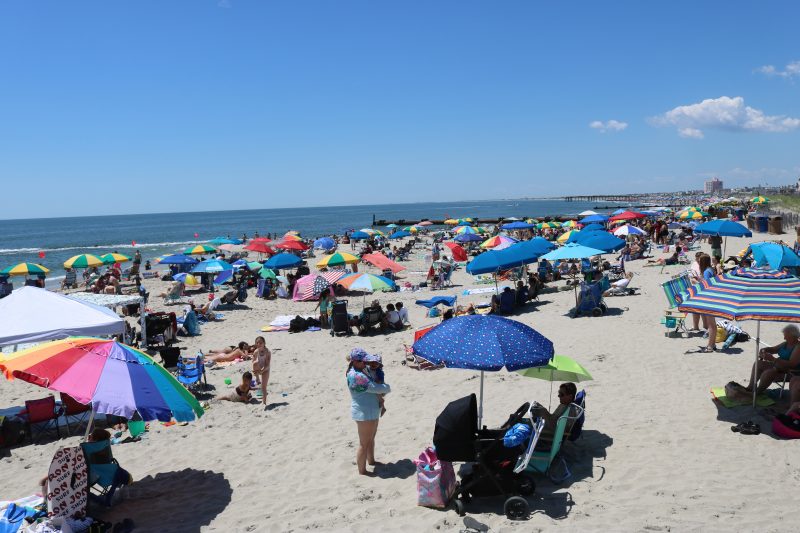 By MADDY VITALE
When Allan Karas became director of the Ocean City Beach Patrol, he knew there were a lot of things that the lifeguards did well. He also knew that there were some things that could be changed. He reorganized and promoted some of the staff. He assembled a team that he felt would best serve the public and the community.
And that was only the start.
Since Karas, a retired supervisory special agent with the Drug Enforcement Administration (DEA), was hired by the city in 2021, he has brainstormed and thought of ways to help make the beach patrol even stronger, both physically and mentally, with seminars and additional training.
Just last week, Karas and OCBP Deputy Chief Holly Lesser teamed up to bring a weeklong training program on resiliency and peer support to not only those in the patrol who wanted it, but also first responders from throughout the area.
“During my long career with the DEA, I recognized how important addressing mental health and improving the concept of peer support were to public safety professionals," Karas said. "I felt it was important to offer the training to our public safety partners both in Ocean City and outside in the surrounding police, fire, and beach patrol communities without concern for funding."
By MADDY VITALE
When Allan Karas became director of the Ocean City Beach Patrol, he knew there were a lot of things that the lifeguards did well. He also knew that there were some things that could be changed. He reorganized and promoted some of the staff. He assembled a team that he felt would best serve the public and the community.
And that was only the start.
Since Karas, a retired supervisory special agent with the Drug Enforcement Administration (DEA), was hired by the city in 2021, he has brainstormed and thought of ways to help make the beach patrol even stronger, both physically and mentally, with seminars and additional training.
Just last week, Karas and OCBP Deputy Chief Holly Lesser teamed up to bring a weeklong training program on resiliency and peer support to not only those in the patrol who wanted it, but also first responders from throughout the area.
“During my long career with the DEA, I recognized how important addressing mental health and improving the concept of peer support were to public safety professionals," Karas said. "I felt it was important to offer the training to our public safety partners both in Ocean City and outside in the surrounding police, fire, and beach patrol communities without concern for funding."
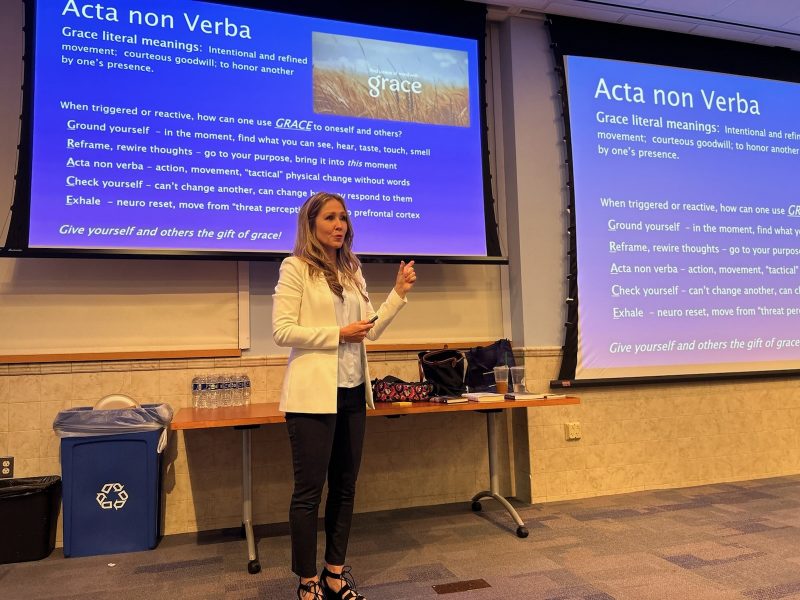 First responders learned about coping skills and peer support in the weeklong training program. (Photo courtesy of OCBP)
Some first responders from the OCBP, the Ocean City Fire Department and the Ocean City Police Department attended.
In addition, there were personnel from the Cape May County Prosecutor’s Office and Sheriff Office in both Cape May and Atlantic Counties, Margate Beach Patrol and others who took part in the training.
The weeklong pilot program, called “Resilient Peer,” was a 40-hour training session for a fee of $200 per person or free of cost for some organizations. It ran from June 5 through June 9 from 9:30 a.m. to 5:30 p.m. The speakers ran through the gamut of how to handle trauma, substance abuse troubles, and how to support your peers.
Lesser said it was an amazing week. The attendees in the class appeared to benefit from the program, she said.
“Monday, we dove into peer support and unpacked a lot of information on what it means to be a peer and how to best support our organizations and coworkers by being a peer,” Lesser noted.
First responders learned about coping skills and peer support in the weeklong training program. (Photo courtesy of OCBP)
Some first responders from the OCBP, the Ocean City Fire Department and the Ocean City Police Department attended.
In addition, there were personnel from the Cape May County Prosecutor’s Office and Sheriff Office in both Cape May and Atlantic Counties, Margate Beach Patrol and others who took part in the training.
The weeklong pilot program, called “Resilient Peer,” was a 40-hour training session for a fee of $200 per person or free of cost for some organizations. It ran from June 5 through June 9 from 9:30 a.m. to 5:30 p.m. The speakers ran through the gamut of how to handle trauma, substance abuse troubles, and how to support your peers.
Lesser said it was an amazing week. The attendees in the class appeared to benefit from the program, she said.
“Monday, we dove into peer support and unpacked a lot of information on what it means to be a peer and how to best support our organizations and coworkers by being a peer,” Lesser noted.
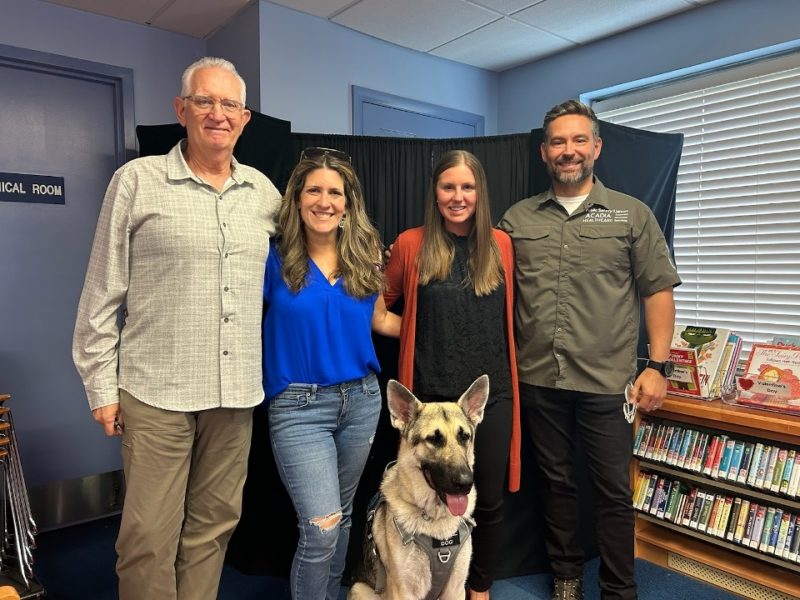 From left, Jim Nestor, Jennie Hill with her Wounded Blue Foundation device dog, Barren, Ocean City Beach Patrol Deputy Chief Holly Lesser and Bill Mazur, after a training session this past week. (Photo courtesy of OCBP)
On Tuesday, the peer support training delved a bit deeper, Lesser explained.
“We continued our peer support training and got deep into the topic of substance use disorder, SUD, and how to help individuals who may experience this in their lives,” she said.
That was when the class heard from Dickie Noles, a pitcher with the Philadelphia Phillies 1980 World Series championship team, who spoke about his substance abuse troubles.
“He told his personal story about struggling with SUD and his road to recovery,” Lesser said.
On Wednesday and Thursday, June 7 and June 8, the class focused on resiliency and why it is so important to be resilient when you are a first responder.
“Wednesday was a very moving and emotional day, hearing our peers unpack some of their traumas and how they coped with them,” Lesser said. “We have been learning from one another through this process.”
From left, Jim Nestor, Jennie Hill with her Wounded Blue Foundation device dog, Barren, Ocean City Beach Patrol Deputy Chief Holly Lesser and Bill Mazur, after a training session this past week. (Photo courtesy of OCBP)
On Tuesday, the peer support training delved a bit deeper, Lesser explained.
“We continued our peer support training and got deep into the topic of substance use disorder, SUD, and how to help individuals who may experience this in their lives,” she said.
That was when the class heard from Dickie Noles, a pitcher with the Philadelphia Phillies 1980 World Series championship team, who spoke about his substance abuse troubles.
“He told his personal story about struggling with SUD and his road to recovery,” Lesser said.
On Wednesday and Thursday, June 7 and June 8, the class focused on resiliency and why it is so important to be resilient when you are a first responder.
“Wednesday was a very moving and emotional day, hearing our peers unpack some of their traumas and how they coped with them,” Lesser said. “We have been learning from one another through this process.”
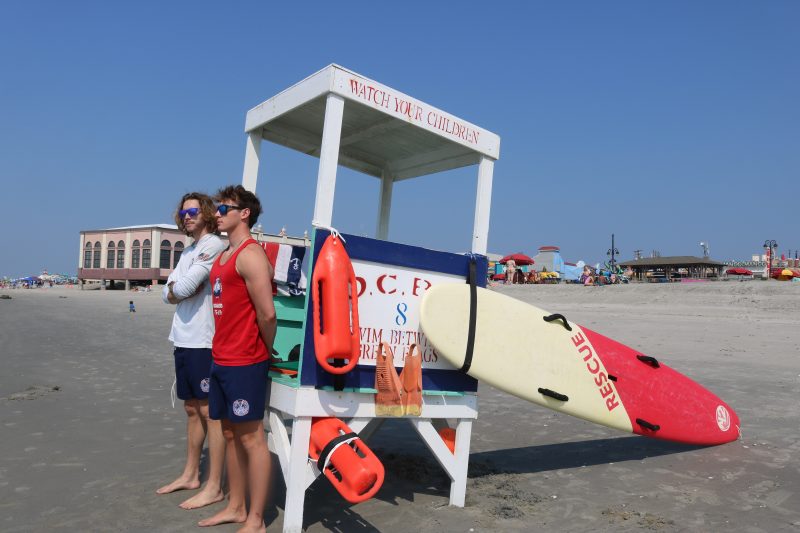 Lifeguards Matt Oves, red shirt, and Jay Morris watch swimmers at 8th Street beach Saturday.
Friday also focused on peer support, suicide, and the power of confidentiality.
Lesser said that the week was important for all first responders, and she was happy that OCBP could bring the training to them.
“I think trainings like this are so important for our public service professions,” she said. “There is such a stigma around talking about mental health and asking for help. I hope to make a positive change to that type of culture in the future.”
In addition to Dickie Noles, others who made the program a success were presenters Jim Nestor, a senior policy advisor, and William Mazur, Public Safety Liaison for Acadia Healthcare, who is also a retired deputy chief of the Atlantic City Police Department. Rob Czepiel, a CEO of Resilient Minds, and Chaplain Program Director Gary Holden were also a part of the program.
Like Lesser, Karas said he was pleased with the reception to the program and hopes to do more like that in the future.
“I was happy to organize this training for our local first responders. I worked with Jim Nestor and Bill Mazur, who partnered with Resilient Minds, to combine the two trainings, peer support and resiliency,” he said.
He said the program, Resilient Peer, “couldn't be more valuable for any occupation.”
“We are learning about ourselves and how to be resilient but also how to be the best peer possible to help our respected organizations, who often are exposed to many types of trauma induced situations,” Karas said.
He said of the participants, "I’m very proud of the men and women who attended this week and thankful to the city for supporting first responders.”
Karas said looking ahead at the summer, there will be more training in the future for the beach patrol and other organizations.
There are also plans in the works for more involvement by the beach patrol in community-minded activities.
For one, there is a beach cleanup planned for 8 a.m. on June 21 beginning at the beach patrol headquarters at 12th Street and Boardwalk, in partnership with the Ocean City Police Department.
“I just want to do so much more community-minded things this summer,” Karas said. “I just really want to take things to the next level for the Ocean City Beach Patrol.”
Lifeguards Matt Oves, red shirt, and Jay Morris watch swimmers at 8th Street beach Saturday.
Friday also focused on peer support, suicide, and the power of confidentiality.
Lesser said that the week was important for all first responders, and she was happy that OCBP could bring the training to them.
“I think trainings like this are so important for our public service professions,” she said. “There is such a stigma around talking about mental health and asking for help. I hope to make a positive change to that type of culture in the future.”
In addition to Dickie Noles, others who made the program a success were presenters Jim Nestor, a senior policy advisor, and William Mazur, Public Safety Liaison for Acadia Healthcare, who is also a retired deputy chief of the Atlantic City Police Department. Rob Czepiel, a CEO of Resilient Minds, and Chaplain Program Director Gary Holden were also a part of the program.
Like Lesser, Karas said he was pleased with the reception to the program and hopes to do more like that in the future.
“I was happy to organize this training for our local first responders. I worked with Jim Nestor and Bill Mazur, who partnered with Resilient Minds, to combine the two trainings, peer support and resiliency,” he said.
He said the program, Resilient Peer, “couldn't be more valuable for any occupation.”
“We are learning about ourselves and how to be resilient but also how to be the best peer possible to help our respected organizations, who often are exposed to many types of trauma induced situations,” Karas said.
He said of the participants, "I’m very proud of the men and women who attended this week and thankful to the city for supporting first responders.”
Karas said looking ahead at the summer, there will be more training in the future for the beach patrol and other organizations.
There are also plans in the works for more involvement by the beach patrol in community-minded activities.
For one, there is a beach cleanup planned for 8 a.m. on June 21 beginning at the beach patrol headquarters at 12th Street and Boardwalk, in partnership with the Ocean City Police Department.
“I just want to do so much more community-minded things this summer,” Karas said. “I just really want to take things to the next level for the Ocean City Beach Patrol.”
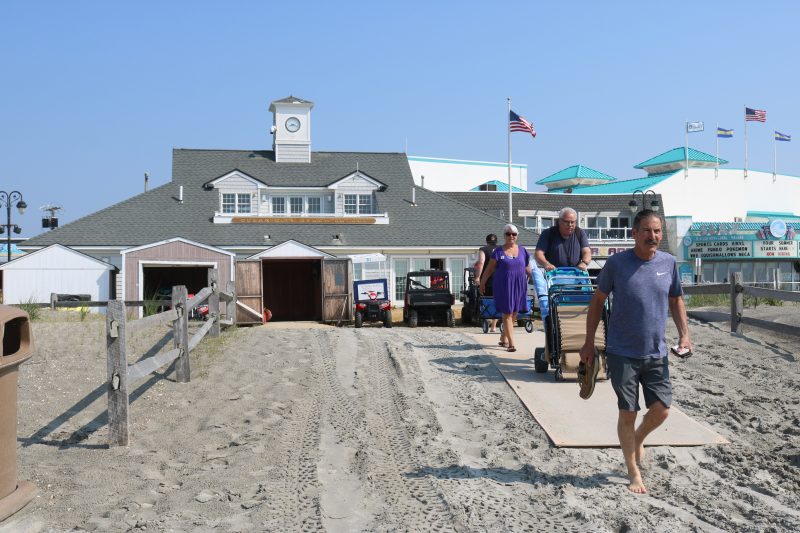 Beachgoers use the beach mat behind the Ocean City Beach Patrol headquarters Saturday at 12th Street.
Beachgoers use the beach mat behind the Ocean City Beach Patrol headquarters Saturday at 12th Street.